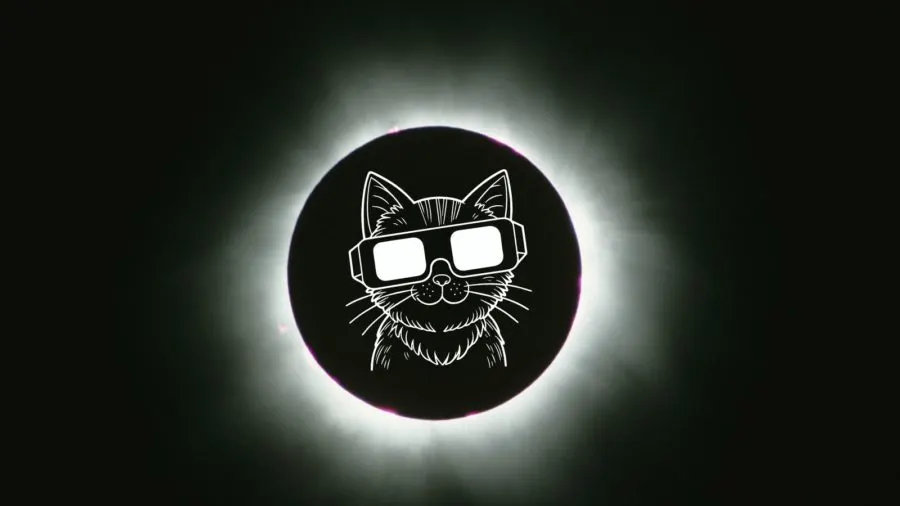For centuries, celestial events like eclipses have fascinated humans, drawing crowds to witness the rare occurrences of solar and lunar eclipses. While we prepare our solar glasses and cameras to capture these moments, a question lingers for every cat lover: How are our feline companions affected by these astronomical events? Let’s look at whether cats experience behavioral changes during eclipses, the potential dangers, and how cat lovers can ensure their pets remain safe and comfortable.

Behavioral Changes
Cats are creatures of habit, with their daily routines deeply intertwined with the natural light cycle. They bask in the sun, become more active during dawn and dusk, and rest when it’s dark. An eclipse, which alters the natural light and dark cycle abruptly, can indeed have a noticeable effect on their behavior.
During a solar eclipse, as daylight turns to an eerie twilight, cat lovers may observe their feline friends showing signs of confusion or restlessness.
Some cats might retreat, seeking shelter as they would at dusk, while others may become unusually curious, pacing around to investigate the sudden change.
It’s not uncommon for cats to respond to the shift in their environment by altering their usual activity levels, either slowing down and preparing for what they perceive as nightfall or becoming more alert due to the unexpected darkness.
Lunar eclipses, though less dramatic in changing the lighting conditions, can still affect cats. The subtle shift in nighttime light may not directly disturb their behavior, but the excitement and altered behavior of their human companions during these events can lead to increased stress or curiosity among our feline friends.
Potential Dangers During Eclipses

If you love coloring, don’t miss our new Eclipse Coloring Book!
The primary concern for humans during a solar eclipse is the risk of eye damage from looking directly at the sun, leading many to wonder if their cats face the same danger. Fortunately, cats are unlikely to gaze at the sun during an eclipse. Their instincts do not drive them to look upwards toward the celestial phenomenon, minimizing the risk of retinal damage.
However, the indirect effects of an eclipse, such as a cat’s response to the sudden change in environment or the heightened emotions of their human companions, can pose risks.
Anxiety and stress can lead to behavioral issues, and in their confusion or curiosity, cats may wander off or injure themselves.
How Cat Lovers Can Support Their Feline Friends During an Eclipse
To ensure that your cat remains unaffected by the eclipse, consider the following tips:
- Maintain Calmness: Cats are sensitive to their surroundings, including the emotions of their human family. Staying calm and composed can help reassure your cat that everything is okay.
- Keep Them Indoors: To prevent your cat from wandering off or becoming overly stressed by the changes outside, keep them indoors in a familiar and secure environment.
- Provide a Safe Space: If your cat tends to get anxious easily, create a comfortable area where they can retreat. Familiar items like their bed, toys, or a piece of your clothing can help soothe them. If members of your family will be running and out to check the progress of the eclipse, be especially mindful not to let your cat slip out. If you have a door dasher in the house, consider restricting your cat to a bedroom so there’s no change to bolt for the door.
- Stick to Routine: As much as possible, adhere to your cat’s regular feeding, play, and rest schedule to provide a sense of normalcy.
- Monitor Their Behavior: Keep an eye on your cat’s behavior during the eclipse. If they seem agitated or stressed, offer them extra attention and comfort.
While eclipses are monumental events for humans, their impact on housecats can vary widely. Most cats are likely to experience minimal direct effects from the eclipse itself, with any behavioral changes more closely tied to alterations in their environment and the behavior of their human companions.
By understanding the potential for stress and taking steps to mitigate it, cat lovers can ensure that their feline friends navigate the eclipse with as little disruption as possible.
- 🎉 GIVEAWAY: Lord of the Pets Portrait of Your Cat! - November 26, 2024
- Review: Lord of the Pets Cat Portraits! - November 26, 2024
- Cat Adoption: FAQ You Might Have - June 28, 2024
